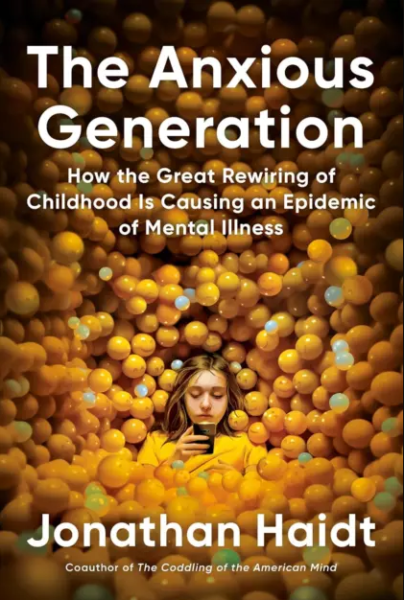Most men get over the strippers-and-sports-cars overreaction pretty quickly, generally to be replaced by a new outlook on life. The guys who have come through the midlife crisis are generally a lot better people — more focused, more outgoing, far less materialistic — because they’ve taken up, however briefly, the perspective of Eternity. If you’re religious, you wonder if you’ll merit heaven. If you’re not, you wonder how you’ll be remembered. Either way, you start thinking about the kind of world you want to leave behind you, and what you’re going to do to achieve it with whatever time is left to you.
Which is why I’ve found the COVID overreaction so bizarre. Realizing your own mortality changes things. You can always tell, for instance, when it has happened to a younger person — when they come home, combat vets often act like middle-aged men going through a midlife crisis. Readjustment to civilian life is hard. Read the great war narratives, and it’s clear that none of them ever really “got over it”. Robert Graves and Ernst Junger, for instance, both lived to ripe old ages (90 and 103, respectively), and were titans in fields far removed from battle … and yet, the war WAS their lives, in some way we who haven’t been through it will never understand, and it comes through in every line they wrote.
If the Covidians were really freaking out about COVID, then, I’d expect one of two broad types of reaction: Either party-hearty midlife crisis mode, or a new determination to get on with whatever’s left of life. Obviously neither of those are true, and I just can’t grasp it — these might be your last few weeks on Earth, and that’s how you’re going to spend them? Sitting in your apartment like a sheep, wearing a mask and eating takeout, glued to a computer screen?
If you want a measure of just how feminized our society has become, there you go. Call this misogyny if you must, but it’s an easily observed fact of human nature — indeed, it has been observed, in every time, place, and culture of which we have knowledge — that post-menopausal women go a bit batty. Though a man might know for certain that he dies tomorrow, he can still keep plugging away today, because he’s programmed to find real meaning in his “work” — we are, after all, running our snazzy new mental software over kludgy old caveman hardware.
Women aren’t like that. They have one “job”, just one, and when they can’t do it anymore, they get weird. In much the same way high-end sports cars would cease to exist if middle aged men ceased to exist, so there are entire aspects of culture that don’t make sense in any other way except: These are channels for the energies of post-menopausal, and therefore surplus-to-requirements, women. You could go so far as to say that pretty much everything we call culture — traditions, history, customs — exist for that reason. Women go from being the bearers, to being the custodians, of the tribe’s future.
Severian, “Life’s Back Nine”, Rotten Chestnuts, 2021-05-11.
April 17, 2024
QotD: The mid-life crisis, male and female versions
April 16, 2024
For you, is no autobahn
eugyppius on the German federal government’s latest brainstorm to achieve their mandated emissions targets:

“Old Autobahn” by en:User:DF08 is licensed under CC BY-SA 3.0 .
… despite the headlines, they are not going to take away our cars. Amazingly, not even the Greens want to do that. For once the story is not about German authoritarianism, or woke insanity or anything like that. Rather, it’s about how nobody can really bring himself to care about the climate anymore – not even our forward-thinking, progressively minded, environmentally responsible political establishment.
For the backstory, we must go all the way back to the pre-Covid era, when aggressive climate legislation was popular even with centre-right CDU voters, and before the electorate had a taste of what Green policies like the draconian home heating ordinances really feel like on the ground.
Back in those halcyon days, when the child saint Greta Thunberg was cutting class to save the earth, Angela Merkel’s government passed the Climate Protection Act. The law mandates a 65% reduction in CO2 emissions compared to 1990 levels by 2030, an 88% reduction by 2040, and an utterly unrealisable carbon neutrality by 2045. In the near term, the Climate Protection Act also establishes maximum annual emissions levels for various economic sectors. Should a given sector exceed its maximum, the responsible Ministry must submit an ominous “action programme” to bring things back on target.
The Climate Protection Act is archetypal climate nonsense. Politicians like to take credit for Doing Something about the climate, but because Doing Something amounts to massive economic restrictions and drastic interventions in daily life, they would prefer not to Do that Something themselves. Far better is to pass legislation committing future governments to Do Something and let them deal with the mess. Then you can reap the short-term rewards of being tough on carbon emissions, without bearing direct responsibility for all the chaos that actually being tough on carbon emissions would unleash. Alas, time marches forwards at a steady pace. I am sure that 2030 sounded like an unimaginably distant date when it was floated at the Paris Accords in 2015, but now it is a mere six years away. That is becoming a big, big problem for the climatists.
You could say that Merkel’s Climate Protection Act bequeathed the hapless Scholz government a small collection of ticking time bombs, which they’ve developed a considerable interest in defusing. One way to do this, is to revise the Climate Protection Act and remove its strict sector-based emissions limits before anybody is forced to field a climate-saving “action programme”. In the meantime, they’ve been studiously ignoring the requirements, which is why our Minister of Economic Destruction Robert Habeck could be found complaining back in June that no cabinet ministers were complying with Climate Protection Act emissions limits.
April 15, 2024
Is “Big Trans” in retreat?
In the latest Weekly Dish, Andrew Sullivan considers just how much things have changed in recent years, especially with the publication of the Cass Report on the true medical situation for children being prescribed puberty blocking or opposite sex hormones … and it really doesn’t match the rhetoric we’ve been hearing from activists over the last few years:
Tribalization does funny things to people. If you’d told me a decade ago that within a few years, Republicans would be against Ukraine defending itself from a Russian invasion, and Democrats would be pulling the Full Churchill to counter the Kremlin, I’d have gently asked what sativa strain you were smoking.
If you’d told me the Democrats would soon be the party most protective of the CIA and the FBI, and that Republicans would regard them as part of an evil “deep state,” ditto. And who would have thought that a president accused in 2017 of having “no real ideology [but] white supremacy” would today be doubling his support with black voters, and tripling it with black men? Who would have bet the Dems would go all-in on Big Pharma when it came to Covid vaccines? And who would have thought Republicans who long carried little copies of the Constitution in their suit pockets would lead a riot to prevent the peaceful transfer of power? You live and learn.
But would anyone have predicted that the Democrats and the left in general would soon favor a vast, completely unregulated, for-profit medical industry that would conduct a vast, new experimental treatment on children with drugs that were off-label and without any clinical trials to prove their effectiveness and safety? In the 2016 presidential race, both Dem contenders railed against Big Pharma, with Bernie going as far as calling the industry “a health hazard for the American people.” Back in 2009, you saw MSM stories like this:
The Food and Drug Administration said adults using prescription testosterone gel must be extra careful not to get any of it on children to avoid causing serious side effects. These include enlargement of the genital organs, aggressive behavior, early aging of the bones, premature growth of pubic hair, and increased sexual drive. Boys and girls are both at risk. The agency ordered its strongest warning on the products — a so-called black box.
Nowadays, it’s deemed a “genocide” if you don’t hand out these potent drugs to children almost on demand. Drugs used to castrate sex offenders and to treat adult prostate cancer have been re-purposed, off-label, to sexually reassign children before they even got through puberty. Big Pharma created lucrative “customers for life” by putting kids on irreversible drugs for a condition that could not be measured or identified by doctors and entirely self-diagnosed by … children.
And what if over 80 percent of the children subject to this experiment were of a marginalized group — gay kids? And the result of these procedures was to cure them of same-sex attraction by converting them to the opposite sex? I simply cannot imagine that any liberal or progressive would hand over gender-nonconforming children, let alone their own children, to the pharmaceutical and medical-industrial complex to be experimented on in this way.
And yet for years now, this has been the absolutely rigid left position on sex reassignments for children with gender dysphoria on the verge of puberty. And for years now, those of us who have expressed concern have been vilified, hounded, canceled and physically attacked for our advocacy. When we argued that children should get counseling and support but wait until they have matured before making irreversible, life-long medical choices they have no way of fully understanding, we were told we were bigots, transphobes and haters.
The reason we were told that children couldn’t wait and mature was that they would kill themselves if they didn’t. This is one of the most malicious lies ever told in pediatric medicine. While there is a higher chance of suicide among children with gender distress than those without, it is still extremely rare. And there is absolutely no solid evidence that treatment reduces suicide rates at all.
Don’t take this from me. The most authoritative and definitive study of the question has just been published in Britain, The Cass Report, by Hilary Cass, one of the most respected pediatricians in the country. It’s 388 pages long, crammed with references, five years in the making, based on serious research and interviews with countless doctors, parents, scientists and, most importantly, children and trans people directly affected. In the UK, its findings have been accepted by both major parties and even some of the groups who helped pioneer and enable this experiment. I urge you to read it — if only the preliminary summary.
It’s a decisive moment in this debate. After weighing all the credible evidence and data, the report concludes that puberty blockers are not reversible and not used to “take time” to consider sex reassignment, but rather irreversible precursors for a lifetime of medication. It says that gender incongruence among kids is perfectly normal and that kids should be left alone to explore their own identities; that early social transitioning is not neutral in affecting long-term outcomes; and that there is no evidence that sex reassignment for children increases or reduces suicides.
How on earth did all the American medical authorities come to support this? The report explains that as well: all the studies that purport to show positive results are plagued by profound limitations: no control group, no randomization, no double-blind studies, no subsequent follow-up with patients, or simply poor quality.
April 12, 2024
When it comes to media coverage of environmental issues “bad news sticks around like honey, while good news dries up like water”
In Spiked, Matt Ridley debunks the attitude — universal among climate activists — that humanity’s mere existence is “bad for the planet”:

A 16 foot high sculpture of a polar bear and cub, afloat on a small iceberg on the River Thames, passes in front of Tower Bridge on 26 January 2009 in London, England.
Spiked
Over the past few years, we have been subject to endless media reports on the devastating impact humanity is having on the global bee population. “Climate change is presenting huge challenges to our bees”, claimed the Irish Times last year. “Where has all the honey gone?”, asked the Guardian earlier this year.
The news from last week may come as a shock to some, then. It turns out that America actually has more bees than ever before, having added a million hives in just five years. The Washington Post, which reported these facts, was certainly surprised given what it calls “two decades of relentless colony-collapse coverage”.
Some of us, however, have been pointing out for more than a decade that the mysterious affliction called “colony collapse disorder”, which caused a blip in honey-bee numbers in the mid-2000s, was always only a temporary phenomenon. Globally, bees are doing better than ever. The trouble is that bad news sticks around like honey, while good news dries up like water.
Honey bees are a domesticated species, so their success depends partly on human incentives. In the case of America, the Texas state government’s decision to reduce property taxes on plots containing bee hives has boosted the popularity of beekeeping. When bees were in trouble, they were seen as a measure of the health of the environment generally. So their recovery can be regarded as a sign of good environmental health.
Why do stories of environmental doom, like this one about collapsing bee colonies, linger in the public consciousness, despite being outdated and wrong? The media are partly to blame. For environmental reporters, bad news is always more enticing than good. It’s more likely to catch the attention of editors and more likely to get clicks from readers. Good news is no news.
So I have a simple rule of thumb to work out when an environmental problem is on the mend: it drops out of the news. (The same is true of countries, by the way. When I was young, Angola and Mozambique were often in the news because they were torn by war; not today, because they are at peace.)
Take whales. In the 1960s, they were the (literal) posterboys of environmental alarm. There were just 5,000 humpback whales in the whole world and they seemed headed for extinction. Today, there are 135,000 humpback whales, which represents a 27-fold increase. For the first time in centuries they sometimes gather in groups of over a hundred. I have even seen them several times myself, which I had assumed as a boy I never would.
Most other whale species are doing almost as well: blue, fin, right, bowhead, sperm, grey, minke – all are increasing steadily in numbers (though certain subpopulations, such as North Atlantic right whales, are still struggling). But the story of whales’ resurgence just doesn’t make the news.
Or take polar bears. Just a few years ago, greens were constantly claiming that they were facing imminent extinction. In 2017, National Geographic published a video of a starving polar bear, with the tagline, “This is what climate change looks like”. It was viewed 2.5 billion times. No climate conference or Greenpeace telly advert was complete without a picture of a sad polar bear on an ice floe. Today, that’s a less common sight, because it is harder and harder to deny that polar bears are less and less rare. Despite heroic efforts by environmentalists to claim otherwise, there is now no hiding the fact that polar-bear numbers have not declined and have probably increased, with some populations having doubled over the past few decades. So much so that some environmentalists and researchers no longer think that polar bears are suitable symbols of man’s threat to the planet.
The refusal of polar-bear numbers to conform to the eco-pessimists’ narrative should not be a surprise. In 2009, Al Gore claimed that the Arctic polar ice cap could disappear in as little as five years. A decade on, that is still nowhere near happening yet. Besides, polar bears have always taken refuge on land in late summer in regions where the ice does melt, such as Hudson Bay.
Another Arctic species, the walrus, is doing so well now that it sometimes turns up on beaches in Britain. It’s the same story for fur seals, elephant seals and king penguins. A few years ago, I visited South Georgia in the Antarctic and saw thousands upon thousands of all three species, when little over a century ago they would have been very rare there.
These whales, seals, penguins and bears are booming for a very simple reason: we stopped killing them. Their meat could not compete with beef. And, above all, their fur and blubber could not compete with petroleum products. Or to put it another way, fossil fuels saved the whale.
April 9, 2024
Checking in on the front lines of paleontology research
Sarah Hoyt is amazed and surprised at some recent revelations about the latest paleontological discoveries:
Yesterday I did something I used to do more often, and looked into the latest discoveries in paleontology and archaeology and such.
And shortly after remembered why I no longer do it every month.
Apparently the latest, greatest news is that — yo, this is amazing — they’re finally not studying pre-history through the eyes of racism and sexism, and as such have determined that pre-historic hunting parties were as much as 80% female.
This is a discovery that of course makes perfect sense. No doubt the males were all back at base camp, chest-feeding the babies. Thereby freeing the pre-historic girl bosses to go and hunt them some mammoth.
If you’re staring at the screen with dropped jaws, I haven’t gone insane. I know this is utter and complete nonsense. It’s not my fault that the people running all our intellectual institutions, including research are morons studying to be idiots.
Applying the Heinlein filter for the actual reason they have to believe that up to 80% — 80%! — of pre-historic hunters were female, i.e. “Again and again, what are the facts?” we get that they found one grave — one — where the DNA of the remains are female (and here we’ll keep quiet about the strange idea that 6000 (I think) year old DNA is easily extracted, non-contaminated, etc. We’ll pretend we don’t know all the times they walked back “new species” because the DNA amplification techniques CREATED those discoveries.)
Let’s assume they’re correct and this was a female, buried with hunting implements. Sure, maybe she was a hunter. There will always be one or two in a large enough band, for the reason that in primitive societies some women are brought up as male: lack of a son, need to support the family, etc. (It is rarely a sexual thing, or because the person WANTED this. In fact it’s often decided for them before they are weaned. In fact, in primitive/ancient societies including the ones of our ancestors that we know about in detail, there was remarkably little room for self expression, self-conception or self interest. When you live close to the bone, such things are subjugated to the needs of the family, the clan, the tribe, more or less in that order. Because survival is hard.) We’re also informed, in BREATHLESS tones that it’s now thought that spear throwers were used to make sure women could throw spears fast enough! That’s why they exist.
But spear throwers are made and used by males, the world over. Go look at the tubes of you and you’ll see videos of people making them and using them, and they’re all male.
Further there is no society today of the ones still surviving more or less in a stone age way that has that kind of distribution for hunters. More importantly, there is no record of them, going as far back as we can.
Maybe this is because yes indeed, the past (being much closer to the bone, and therefore less willing to indulge in story telling) viewed things through a racist and sexist lens. Why not? After all I grew up in an intensely patriarchal society that still hadn’t adapted to the idea of women taking any hand in intellectual pursuits. And yes, that was unwarranted sexism. And every society is racist against every other (Actually culturist, but it’s often couched in terms of race.)
But still … You’d think that here and there there would be a race of valiant Amazons, whose men stay home and pound the taro while they go out and hunt, right?
But the truth is that if you put this notion to the remaining stone age people, they will laugh till they pee themselves. Yes, I know, I know, they internalized sexism from the evil white colonizers whom they’ve met three times in the last 100 years. That’s how powerful and evil whiteness is.
Or, listen, okay? I know this is just crazy talk, but maybe males and females are different and have evolved to fulfill different reproductive functions. And the reproductive function of females is more onerous than that of males. Women in our natural state, and unless something has gone seriously wrong — which of course makes us of less use to the tribe — spend most of our lives pregnant, nursing or carrying for children too young to care for themselves.
April 8, 2024
“The carbon rebate seems to be one of those rare examples of people getting mad at receiving government money rather than being grateful”
In The Line, Jen Gerson makes a strong argument that the vaunted (by Justin Trudeau and the Liberal Party) carbon tax rebate is actually the big problem with the carbon tax, not the “Conservative misinformation” constantly being pointed at by the government’s paid accomplices in the mainstream media:
Is the purpose of the Liberals’ carbon tax to materially reduce carbon emissions — or is it a wealth redistribution program? I ask because every time the Liberals defend the carbon tax by resorting to the awesomeness of the rebate, what they cease to talk about is how effective it is at actually reducing carbon emissions.
Instead, we fall into an endless series of counterproductive debates about whether what individuals are getting from the rebate equals what they’re paying out in tax. And that debate is repeated every quarter, and each time the carbon tax rises. In other words, our entire political discourse about the tax is centred on wealth redistribution — not emissions.
That makes people suspicious of the government’s actual goals, and skeptical about its claims. This, again, is a problem of message dilution. If you cannot clearly express your intentions, then you’re not going to get political buy-in to your aims. This problem is particularly acute on a policy that is — by definition — demanding a sacrifice of cash and/or quality of life by Canadians. People can get on board with sacrifice, but only if it’s tied to a clear, obtainable, and material objective.
[…]
And here’s where we get into the real dark heart of the problem.
It’s the rebate itself.
I understand why the Canada Carbon Rebate happened. The government wanted to introduce a carbon tax without disproportionately penalizing the poor — the demographic least able to make the investments and lifestyle changes necessary to respond to the tax. But did that relief have to come in the form of a rebate?
Well, no.
There are lots of methods a government can use to ease poverty. But governments love themselves a rebate. Why? Because rebates are normalized vote buying. One that all political parties are guilty of using. The Liberals implemented the rebate thinking Canadians would hit their mailboxes every quarter, see a few hundred bucks, and get warm fuzzy feelings for Papa Trudeau and the natural governing party. “Government’s looking out for me!”
Getting government cheques is popular, and the Liberals were no doubt trying to replicate the appeal of the Canada Child Benefit.
But that didn’t happen here. The carbon rebate seems to be one of those rare examples of people getting mad at receiving government money rather than being grateful. Why?
Well, may I suggest that it’s because every time people open up those cheques, instead of processing the dopamine hit of “free” money, they’re instead reminded of how much they had to pay in to get it. They do the math in their head, think about their rising grocery bills and gas, and come away thinking “not worth it”. Every single quarter, millions of Canadian households are feeling as if they are paying dollars to get dimes — and it’s pissing them right off. Further, demanding they acknowledge they’re better off in the exchange is only adding salt to the wound. Throwing Parliamentary Budget Officer (PBO) reports at them doesn’t change their minds. It just pisses them off more.
To put it more pithily — a benefit is a gift. A rebate is a value proposition. And a hell of a lot of Canadians are looking at this rebate and determining that its value is wanting — all the more so as the goals of that purchase haven’t been clearly articulated.
April 5, 2024
April 4, 2024
QotD: What we mean by the term “indigenous”
Well, if by indigenous we mean “the minimally admixed descendants of the first humans to live in a place”, we can be pretty confident about the Polynesians, the Icelanders, and the British in Bermuda. Beyond that, probably also those Amazonian populations with substantial Population Y ancestry and some of the speakers of non-Pama–Nyungan languages in northern Australia? The African pygmies and Khoisan speakers of click languages who escaped the Bantu expansion have a decent claim, but given the wealth of hominin fossils in Africa it seems pretty likely that most of their ancestors displaced someone. Certainly many North American groups did; the “skraelings” whom the Norse encountered in Newfoundland were probably the Dorset, who within a few hundred years were completely replaced by the Thule culture, ancestors of the modern Inuit. (Ironically, the people who drove the Norse out of Vinland might have been better off if they’d stayed; they could hardly have done worse.)
But of course this is pedantic nitpicking (my speciality), because legally “indigenous” means “descended from the people who were there before European colonialism”: the Inuit are “indigenous” because they were in Newfoundland and Greenland when Martin Frobisher showed up, regardless of the fact that they had only arrived from western Alaska about five hundred years earlier. Indigineity in practice is not a factual claim, it’s a political one, based on the idea that the movements, mixtures, and wholesale destructions of populations since 1500 are qualitatively different from earlier ones. But the only real difference I see, aside from them being more recent, is that they were often less thorough — in large part because they were more recent. In many parts of the world, the Europeans were encountering dense populations of agriculturalists who had already moved into the area, killed or displaced the hunter-gatherers who lived there, and settled down. For instance, there’s a lot of French and English spoken in sub-Saharan Africa, but it hasn’t displaced the Bantu languages like they displaced the click languages. Spanish has made greater inroads in Central and South America, but there’s still a lot more pre-colonial ancestry among people there than there is pre-Bantu ancestry in Africa. I think these analogies work, because as far as I can tell the colonization of North America and Australia look a lot like the Early European Farmer and Bantu expansions (technologically advanced agriculturalists show up and replace pretty much everyone, genetically and culturally), while the colonization of Central and South America looks more like the Yamnaya expansion into Europe (a bunch of men show up, introduce exciting new disease that destabilizes an agricultural civilization,1 replace the language and heavily influence the culture, but mix with rather than replacing the population).
Some people argue that it makes sense to talk about European colonialism differently than other population expansions because it’s had a unique role in shaping the modern world, but I think that’s historically myopic: the spread of agriculture did far more to change people’s lives, the Yamnaya expansion also had a tremendous impact on the world, and I could go on. And of course the way it’s deployed is pretty disingenuous, because the trendier land acknowledgements become, the more the people being acknowledged start saying, “Well, are you going to give it back?” (Of course they’re not going to give it back.) It comes off as a sort of woke white man’s burden: of course they showed up and killed the people who were already here and took their stuff, but we’re civilized and ought to know better, so only we are blameworthy.
More reasonable, I think, is the idea that (some of) the direct descendants of the winners and losers in this episode of the Way Of The World are still around and still in positions of advantage or disadvantage based on its outcome, so it’s more salient than previous episodes. Even if, a thousand years ago, your ancestors rolled in and destroyed someone else’s culture, it still sucks when some third group shows up and destroys yours. It’s just, you know, a little embarrassing when you’ve spent a few decades couching your post-colonial objections in terms of how mean and unfair it is to do that, and then the aDNA reveals your own population’s past …
Reich gets into this a bit in his chapter on India, where it’s pretty clear that the archaeological and genetic evidence all point to a bunch of Indo-Iranian bros with steppe ancestry and chariots rolling down into the Indus Valley and replacing basically all the Y chromosomes, but his Indian coauthors (who had provided the DNA samples) didn’t want to imply that substantial Indian ancestry came from outside India. (In the end, the paper got written without speculating on the origins of the Ancestral North Indians and merely describing their similarity to other groups with steppe ancestry.) Being autochthonous is clearly very important to many peoples’ identities, in a way that’s hard to wrap your head around as an American or northern European: Americans because blah blah nation of immigrants blah, obviously, but a lot of northern European stories about ethnogenesis (particularly from the French, Germans, and English) draw heavily on historical Germanic tribal migrations and the notion of descent (at least in part) from invading conquerors.
One underlying theme in the book — a theme Reich doesn’t explicitly draw out but which really intrigued me — is the tension between theory and data in our attempts to understand the world. You wrote above about those two paradigms to explain the spread of prehistoric cultures, which the lingo terms “migrationism” (people moved into their neighbors’ territory and took their pots with them) and “diffusionism”2 (people had cool pots and their neighbors copied them), and which archaeologists tended to adopt for reasons that had as much to do with politics and ideology as with the actual facts on (in!) the ground. And you’re right that in most cases where we now have aDNA evidence, the migrationists were correct — in the case of the Yamnaya, most modern migrationists didn’t go nearly far enough — but it’s worth pointing out that all those 19th century Germans who got so excited about looking for the Proto-Indo-European Urheimat were just as driven by ideology as the 21st century Germans who resigned as Reich’s coauthors on a 2015 article where they thought the conclusions were too close to the work of Gustaf Kossinna (d. 1931), whose ideas had been popular under the Nazis. (They didn’t think the conclusions were incorrect, mind you, they just didn’t want to be associated with them.) But on the other hand, you need a theory to tell you where and how to look; you can’t just be a phenomenological petri dish waiting for some datum to hit you. This is sort of the Popperian story of How Science Works, but it’s more complex because there are all kinds of extra-scientific implications to the theories we construct around our data.
The migrationist/diffusionist debate is mostly settled, but it turns out there’s another issue looming where data and theory collide: the more we know about the structure and history of various populations, the more we realize that we should expect to find what Reich calls “substantial average biological differences” between them. A lot of these differences aren’t going to be along axes we think have moral implications — “people with Northern European ancestry are more likely to be tall” or “people with Tibetan ancestry tend to be better at functioning at high altitudes” isn’t a fraught claim. (Plus, it’s not clear that all the differences we’ve observed so far are because one population is uniformly better: many could be explained by greater variation within one population. Are people with West African ancestry overrepresented among sprinters because they’re 0.8 SD better at sprinting, or because the 33% higher genetic diversity among West Africans compared to people without recent African ancestry means you get more really good sprinters and more really bad ones?) But there are a lot of behavioral and cognitive traits where genes obviously play some role, but which we also feel are morally weighty — intelligence is the most obvious example, but impulsivity and the ability to delay gratification are also heritable, and there are probably lots of others. Reich is adorably optimistic about all this, especially for a book written in 2018, and suggests that it shouldn’t be a problem to simultaneously (1) recognize that members of Population A are statistically likely to be better at some thing than members of Population B, and (2) treat members of all populations as individuals and give them opportunities to succeed in all walks of life to the best of their personal abilities, whether the result of genetic predisposition or hard work. And I agree that this is a laudable goal! But for inspiration on how our society can both recognize average differences and enable individual achievement, Reich suggests we turn to our successes in doing this for … sex differences! Womp womp.
Jane Psmith and John Psmith, “JOINT REVIEW: Who We Are and How We Got Here, by David Reich”, Mr. and Mrs. Psmith’s Bookshelf, 2023-05-29.
1. aDNA works for microbes too, and it looks like Y. pestis, the plague, came from the steppe with the Yamnaya. It didn’t yet have the mutation that causes buboes, but the pneumonic version of the disease is plenty deadly, especially to the Early European Farmers who didn’t have any protection against it. In fact, as far as we can tell, in all of human history there have only been four unique introductions of plague from its natural reservoirs in the Central Asian steppe: the one that came with or slightly preceded the Yamnaya expansion around 5kya, the Plague of Justinian, the Black Death, and an outbreak that began in Yunnan in 1855. The waves of plague that wracked Europe throughout the medieval and early modern periods were just new pulses of the strain that had caused Black Death. Johannes Krause gets into this a bit in his A Short History of Humanity, which I didn’t actually care for because his treatment of historic pandemics and migrations is so heavily inflected with Current Year concerns, but I haven’t found a better treatment in a book so it’s worth checking it out from the library if you’re interested.
2. I cheated with that “pots not people” line in my earlier email; it usually gets (got?) trotted out not as a bit of epistemological modesty about what the archaeological record is capable of showing, but as a claim that the only movements involved were those of pots, not of people.
March 28, 2024
Why European farmers are revolting
spiked
Published Mar 27, 2024Europe’s farmers are rising up – and the elites are terrified. From the Netherlands to Germany to Ireland, farmers are taking to the streets, parking their tractors on the establishment’s lawn, spraying buildings with manure and bringing life to a standstill. The reason? Because unhinged green regulations, dreamt up by European Union bureaucrats, are immiserating them. In this spiked video polemic, Fraser Myers explores the roots of the farmers’ revolt across the continent – and explains why it must succeed. Watch, share and let us know what you think in the comments.
Support spiked:
https://www.spiked-online.com/support/
Sign up to spiked‘s newsletters: https://www.spiked-online.com/newslet…
Check out spiked‘s shop: https://www.spiked-online.com/shop/
March 25, 2024
One major change in sexual behaviour since the mid-20th century
David Friedman usually blogs about economics, medieval cooking, or politics. His latest post carefully avoids (almost) all of that:

I didn’t have a convenient graphic to use for this post … but I know not to Google something like this.
My picture of sexual behavior now and in the past is based on a variety of readily observable sources — free online porn for the present, writing, both pornography and non-pornographic but explicit, for the past. On that imperfect and perhaps misleading evidence the pattern of when oral sex was or was not common in our society in recent centuries is the opposite of what one would, on straightforward economic grounds, expect.
Casanova’s memoirs provide a fascinating picture of eighteenth century Europe, including its sexual behavior. He mentions incest, male homosexuality, lesbianism, which he regards as normal for unmarried girls:
Marton told Nanette that I could not possibly be ignorant of what takes place between young girls sleeping together.
“There is no doubt,” I said, “that everybody knows those trifles …
I do not believe he ever mentions either fellatio or cunnilingus. Neither does Fanny Hill, published in London in 1748, when Casanova was twenty-three.
Frank Harris, writing in the early 20th century, is familiar with cunnilingus, uses it as a routine part of his seduction tactics, but treats it as something sufficiently exotic so that he had to be talked into trying it by a woman unwilling to risk pregnancy. I do not think he ever mentions fellatio.
Modern online porn in contrast treats both fellatio and cunnilingus as normal parts of foreplay, what routinely comes between erotic kissing and vaginal intercourse.
One online article on the history of fellatio that I found dated the change in attitudes to after the 1976 Hite Report, which found a strongly negative attitude among women to performing it. In contrast:
Today, the act is something more like bread before dinner: noteworthy only if it’s absent. (Fifty Shades of Grey and How One Sex Act Went Mainstream)
And from another, present behavior:
Oral sex precedes and often replaces sexual intercourse because it’s perceived to be noncommittal, quick and safe. For some kids it’s a cool thing to do; for others it’s a cheap thrill. Raised in a culture in which speed is valued, kids, not surprisingly, seek instant gratification through oral sex (the girl by instantly pleasing the boy, the boy by sitting back and enjoying the ride). A seemingly facile command over the sexual landscape of one’s partner is achieved without the encumbrances of clothes, coitus and the rest of the messy business. The blow job is, in essence, the new joystick of teen sexuality. (Salon)
Contrasted with:
When I was a teenager, in the bad-taste, disco-fangled ’70s, fellatio was something you graduated into. Rooted in the great American sport of baseball, the sexual metaphors of my generation put fellatio somewhere after home base, way off in the distant plains of the outfield. In fact, skipping all the bases and going directly to fellatio was the sort of home run reserved only for racy, borderline delinquents, who enjoyed a host of licentious and forbidden activities that made them stars in the firmament of teen recklessness.
March 23, 2024
QotD: The SCIENCE was SETTLED in the 1970s
When it comes to Leftie, it’s really hard to sort out what’s intentional from what’s merely wrong, or outdated, or stupid, or some combination of the above. So while there really does seem to be some kind of coordinated push to get us to eat grass and bugs, the red meat thing is, I think, just old misinformation that Leftie can’t admit has been overtaken by events (because, of course, Leftists can never be wrong about anything). And I’ll even kinda sorta give them a pass on that, because I know a lot of medical people who learned the “red meat is bad for you” mantra back in the days and still haven’t gotten over it …
For younger readers, back in the late 70s the nutritional Powers That Be got in bed with the corn lobby. It sounds funny, but they were and are huge, the corn lobby — why do you think we’re still getting barraged with shit about ethanol, even though it’s actually much worse for the environment than plain ol’ dinosaur juice, when you factor in all the “greenhouse emissions” from growing and harvesting it? Anyway, ethanol wasn’t a thing back then … but corn syrup was, and so suddenly, for no reason whatsoever, the PTB decided that fat was bad and carbohydrates were good.
Teh Science (TM) for this was as bogus and politicized as all the other Teh Science (TM) these days, but since we still had a high degree of social and institutional trust back then — living in a country that’s still 85% White will do that — nobody questioned it, and so suddenly everything had to be “fat free”, lest you get high blood pressure and colon cancer and every other damn thing (ever notice how, with Teh Science (TM), everything they decide is bad suddenly correlates with everything that has ever been bad? Funny, that). But since fat is what makes food taste good, they had to find a tasty substitute … and whaddya know, huge vats full of corn syrup just kinda happened to be there. Obesity rates immediately skyrocketed; who’d have thunk it?
… but again, this isn’t a deliberate thing with your average Leftie. You know how they are about Teh Science (TM), even Teh Science (TM) produced by people who thought polyester bellbottoms were a great look, which alone should tell you everything you need to know. They just learned “red meat is bad”, and so, being the helpful sorts they are, decided to boss you around about it. You know, for your own good.
Severian, “Friday Mailbag / Grab Bag”, Rotten Chestnuts, 2021-06-25.
March 22, 2024
Four years later
Kulak hits the highlights of the last four years in government overstretch, civil liberties shrinkage, the rise of tyrants local and national, and the palpably still-growing anger of the victims:
4 years ago, at this exact moment, we were in the “two weeks” that were supposed to flatten the Curve of Covid.
4 years ago you were still a “conspiracy theorist” if you thought it would be anything more than a minor inconvenience that would last less than a month.
Of course if you predicted that this would not last 2 weeks, but over 2 years; that within 2 months anti-lockdown protests would end in storming of state houses and false-flag FBI manufactured kidnapping attempts of Governors; that within 3 riots would burn a dozens of American cities; that the election would be inconclusive; that matters would go before the US Supreme Court, again; that a riot/mass entrapment would take place within the halls of congress … And then that this was just the Beginning …
That Big-Pharma would rush a vaccine which may well have been more dangerous that the virus; that Australia and various countries would build concentration camps for unvaccinated; that nearly all employers would be pressured or mandated to FORCE this vaccine on their employees; that vaccine passports would be implemented to track your biological status; that Canada and several other countries would implement travel restrictions on the unvaccinated and collude with their neighbors to prevent their population escaping; and then that, nearly 2 years from 2weeks to slow the spread, Canadians!? would mount one of the most logistically complex protests in human history, in the dead of winter, besieging Ottawa and blockading the US border to all trade in an apocalyptic showdown to break free of lockdowns …
Well … not even Alex Jones predicted all of that, though he got a remarkable amount of it.
Indeed the reverence with which Jones is now treated, a Cassandra-like oracle who predicts the future with seemingly (and memeably) 100% clairvoyance only to doomed to disbelief. That alone would have been unpredictable, or unbelievable in those waning days of the long 2019, those first 2-3 months when you could imagine 2020 would MERELY be an Trumpianly heated election cycle like 2016, and not a moment Fukuyama’s veil threatened to tear and History pour back into the world.
Oh, and also the bloodiest European war since the death of Stalin broke out.
March 14, 2024
The insane pursuit of a “zero waste economy”
Tim Worstall explains why it does not make economic sense to pursue a truly “zero waste” solution in the vast majority of cases:
It’s entirely possible to think that waste minimisation is a good idea. It’s also possible to think that waste minimisation is insane. The difference is in what definition of the word “waste” we’re using here. If by waste we mean things we save money by using instead of not using then it’s great. If by waste we mean just detritus then it’s insane.
Modern green politics has — to be very polite about it indeed — got itself confused in this definitional battle. Which is why we get nonsense like this being propounded as potential political policy:
A Labour government would aim for a zero-waste economy by 2050, the shadow environment secretary has said.
Steve Reed said the measure would save billions of pounds and also protect the environment from mining and other negative actions. He was speaking at the Restitch conference in Coventry, held by the thinktank Create Streets.
Labour is finalising its agenda for green renewal and Reed indicated a zero-waste economy would be part of this.
This would mean the amount of waste going to landfill would be drastically reduced and valuable raw materials including plastic, glass and minerals reused, which would save money for businesses who would not have to buy, import or create raw materials.
The horror here does depend upon that definition of waste. Or, if we want to delve deeper, the definition of resource that is being saved.
[…]
OK. So, we’ve two possible models here. One is homes sort into 17 bins or whatever the latest demand is. Or, alternatively, we have big factories where all unsorted rubbish goes to. To be mechanically sorted. Right — so our choice between the two should be based upon total resource use. But when we make those comparisons we do not include that household time. 25 million households, 30 minutes a week, 450 million hours a year. At, what, minimum wage? £10 an hour (just to keep my maths simple) is £4.5 billion a year. That household sorting is cheaper — sorry, less resource using — than the factory model is it?
And that little slip — cheaper, less resource using — is not really a slip. For we are in a market economic system. Resources have prices attached to them. So, we can measure resource use — imperfectly to be sure but usefully — by the price of different ways of doing things. Cool!
At which point, recycling everything, moving to a zero waste economy, is more expensive than the current system. Therefore it uses more resources. We know this because we always do have to provide a subsidy to these recycling systems. None of them do make a profit. Or, rather, when they do make a profit we don’t even call them recycling, we call them scrap processing.
Which all does lead us to a very interesting even if countercultural conclusion. The usual support for recycling is taken to be an anti-price, anti-market, even anti-capitalist idea. Supported by the usual soap dodging hippies. But, as actually happens out in the real world, recycling is one of those things that should be — even if it isn’t — entirely dominated by the price system and markets. Even, dread thought, capitalism. We should only recycle those things we can make a profit by recycling. Because that’s now prices inform us about which systems actually save resources.
“The dark world of pediatric gender ‘medicine’ in Canada”
The release of internal documents from the World Professional Association for Transgender Health (WPATH) revealed just how little science went into many or most juvenile gender transitions and how much the process was being driven politically rather than scientifically. Shannon Douglas Boschy digs into how the WPATH’s methods are implemented in Canada:
An undercover investigation at a Quebec gender clinic recently documented that a fourteen-year-old girl was prescribed testosterone for the purpose of medical gender transition within ten minutes of seeing a doctor. She received no other medical or mental health assessment and no information on side-effects. This is status quo in the dark world of pediatric gender “medicine” in Canada.
On March 5th Michael Shellenberger, one of the journalists who broke the Twitter Files in 2022, along with local Ottawa journalist Mia Hughes, released shocking leaks from inside WPATH, the organization that proclaims itself the global scientific and medical authority on gender affirming care. The World Professional Association of Transgender Health is the same organization that the Quebec gender clinic, and Ottawa’s CHEO, cite as their authority for the provision of sex-change interventions for children.
These leaks expose WPATH as nothing more than a self-appointed activist body overseeing and encouraging experimental and hormonal and surgical sex-change interventions on children and vulnerable adults. Shellenberger and Hughes reveal that members fully understand that children cannot consent to loss of fertility and of sexual function, nor can they understand the lifetime risks that will result from gender-affirming medicalization, and they ignore these breaches of medical ethics.
The report reveals communication from an “Internal messaging forum, as well as a leaked internal panel discussion, demonstrat(ing) that the world-leading transgender healthcare group is neither scientific nor advocating for ethical medical care. These internal communications reveal that WPATH advocates for many arbitrary medical practices, including hormonal and surgical experimentation on minors and vulnerable adults. Its approach to medicine is consumer-driven and pseudoscientific, and its members appear to be engaged in political activism, not science.”
These findings have profound implications for medical and public education policies in Canada and raise serious concerns about the practices of secret affirmations and social transitions of children in local schools.
These leaks follow on the recent publication of a British Medical Journal study (BMJ Mental Health), covering 25-years of data, dispelling the myth that without gender-affirmation that children will kill themselves. The study, comparing over 2,000 patients to a control population, found that after factoring for other mental health issues, there was no convincing evidence that children and youth who are not gender-affirmed were at higher risk of suicide than the general population.
In the last week, a second study was released, this one from the American Urology Association, showing that post-surgical transgender-identified men, who underwent vaginoplasty, have twice the rate of suicide attempts as before affirmation surgery, and showing that trans-identified women who underwent phalloplasty, showed no change in pre-operative rates of suicide and post-operative.
These and other studies are now thoroughly debunking the emotional blackmail myths promoted by WPATH, that the absence of sex-change interventions, suggest that gender-distressed children are at high risk of taking their own lives.










